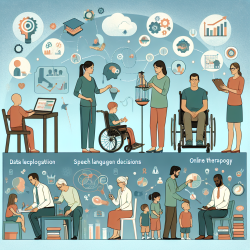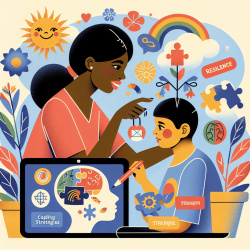The recent study titled Exploring knowledge of autism, its causes and treatment among immigrant and nonimmigrant parents in Somalia/Somaliland offers critical insights into the perceptions and challenges faced by Somali parents of children with autism. The findings underscore the importance of increasing public knowledge on autism, its causes, and treatments. Here’s how practitioners can leverage these insights to improve their skills and outcomes for children through online therapy services like those provided by TinyEYE.
Understanding the Research Findings
The study revealed several key points:
- Many Somali parents believe that autism is caused by the measles vaccine.
- There is a significant lack of knowledge about autism among both the public and healthcare providers in Somalia.
- Parents often seek diagnosis and treatment outside Somalia due to local healthcare providers' inexperience with autism.
- Stigma and discrimination against children with autism and their families are widespread.
Practical Applications for Online Therapy
To address these findings, practitioners can implement the following strategies:
1. Educate Parents and Communities
One of the most pressing needs is to educate parents and communities about autism. Practitioners can create informational sessions and webinars that cover:
- Basic understanding of autism spectrum disorders (ASD)
- Debunking myths, particularly the misconception that vaccines cause autism
- Available treatments and their effectiveness
These sessions can be recorded and made available on-demand to ensure they reach a broad audience.
2. Collaborate with Local Healthcare Providers
Given the lack of local expertise, it’s crucial to build partnerships with healthcare providers in Somalia. This can involve:
- Providing training on the latest diagnostic criteria and treatment methods for autism
- Sharing resources and best practices through online platforms
- Creating a referral network to ensure that children receive timely and appropriate care
3. Address Stigma and Discrimination
Stigma and discrimination are significant barriers to effective treatment. Practitioners can help by:
- Promoting positive stories and testimonials from families who have benefited from therapy
- Encouraging community leaders and influencers to speak out against discrimination
- Creating support groups where parents can share experiences and strategies
4. Leverage Technology for Broader Reach
Online therapy platforms like TinyEYE can be particularly effective in reaching remote or underserved populations. Features such as virtual assessments, teletherapy sessions, and online resources can help bridge the gap in services.
Encouraging Further Research
While the study provides valuable insights, there is a need for further research to understand better the unique challenges faced by Somali families. Practitioners should consider collaborating with researchers to:
- Conduct longitudinal studies to track the effectiveness of various interventions
- Explore cultural factors that influence perceptions and treatment of autism
- Develop culturally sensitive diagnostic tools and treatment plans
By integrating these strategies, practitioners can improve outcomes for children with autism and their families. To read the original research paper, please follow this link: Exploring knowledge of autism, its causes and treatment among immigrant and nonimmigrant parents in Somalia/Somaliland.










